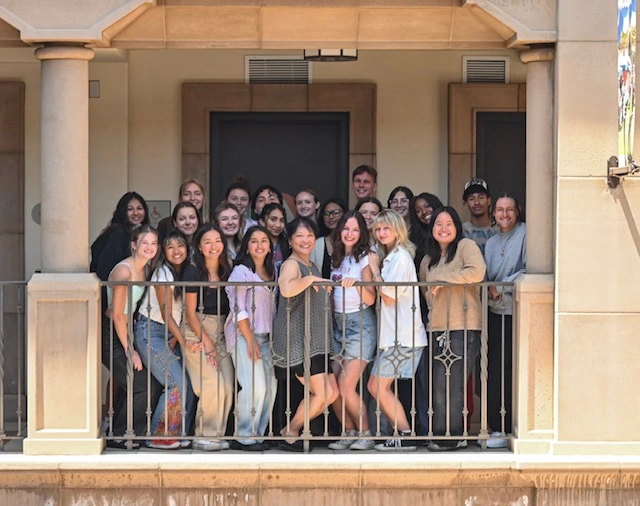Satvika Nitya / Arts & Culture Editor
The Seattle Police Department released bodycam footage of an officer on Sept. 11, who was recorded saying that a female student’s life had “limited value” after she was fatally hit by a police car. This footage was released eight months after the incident occurred, bringing about public outcry over the lack of timeliness around a grave issue and the collective fear among international students.
Officer Daniel Auderer was dispatched to a crash scene on Jan. 23 after another police officer hit and killed 23-year-old, Jaahanvi Kandula, an international student from India, with a police car. Kandula was an exchange student from India who came to the U.S. in 2021 pursuing a master’s degree at Northeastern University Seattle. She was the daughter of a single mother who grew up in the Indian state of Andhra Pradesh. Kandula was set to graduate in Dec. 2023.

Photo courtesy of @Nidhi Mehta/ Facebook
Kandula was on the crosswalk when Officer Kevin Dave, who was responding to an emergency call, sped up to 75 mph in a 25 mph zone and collided with her, killing her on the spot. Officer Daniel Auderer, who is a trained drug recognition expert, responded to the crash to examine if Officer Kevin Dave, who struck Kandula, was impaired at the time of the incident.
The day after the incident, Auderer’s body-worn camera caught a phone conversation between him and the Seattle Police Officers Guild President (SPOG), Mike Solan, where the former was heard saying “but she is dead,” before laughing.
Auderer followed up that statement with arguably dismissive comments as seen in footage released by SPD on YouTube.
“Yeah just write a check” for “$11,000,” “ she was 26 anyway,” stating Kandula’s name wrong, and “she had limited value.”
Kandula’s family gave a statement to ABC News, speaking out about the recent release of the footage.
“It is truly disturbing and saddening to hear insensible comments on the bodycam video from an SPD officer regarding Jaahnavi’s death,” the statement said. “Jaahnavi is a beloved daughter and beyond any dollar value for her mother and family. We firmly believe that every human life is invaluable and [should] not be belittled, especially during a tragic loss.”
This bodycam footage was released eight months after Kandula’s death, a fact that has the South Asian community in Seattle in disbelief. Representatives met with local leaders days after the release of the footage, strongly calling for disciplinary action against Officer Auderer. This sentiment isn’t limited to Seattle or South Asian communities.
USD senior Ahmed Albattal who is an international student from Riyadh, Saudi Arabia, empathized with Kandula’s family, sharing his reaction to the incident.
“I’m really close to my mom, and I know, in a way, what type of experience that would be, especially for her mother,” Albattal said. “Losing your daughter, who you send abroad all by herself, just to get the education she wanted, and then one day she’s gone right before she’s about to fulfill her dream to graduate — I can’t imagine how hard that would be. And not only being in a different country when your daughter dies, but eight months later finding out about the footage and having such comments being said and having to live through that trauma again is unimaginable.”
Mike Solan, the other participant on Auderer’s phone call, was not heard during the recorded footage but when CNN reached out to both the parties involved, Auderer said his comments about Kandula were intended to be a mockery of city lawyers and were not made with malice.
He has reportedly claimed that the footage was taken out of context but he does understand that if a citizen were to hear it, “they would rightfully believe that I was being insensitive to the loss of human life.” Critiques to that statement have emerged online, with many saying that — regardless of intent — matters of death should never be talked about satirically.
The community police commission co-chairs, who are a group of 21 city representatives in Seattle dedicated to provide community-based oversight of SPD and the police accountability system, said that the reported explanation of mockery shows nothing but “a callous dismissiveness toward police accountability systems” and is “unprofessional and inhumane conduct.”
USD senior Catie Rose Martinez shared her thoughts on this dialogue and whether there is a place for satire in matters of death.
“I think it’s extremely insensitive and extremely out of line, because someone’s death is not a joke. If he’s saying that he’s making fun of the incident because the system is wrong, he’s not doing s*** by making satire and not really helping to change the system,” Martinez said. “As police officers, you are supposed to protect people. By making a joke, it’s diminishing the fact that it was a police officer and car that hit her. If a tragic death just happened, especially when it’s a member of your own force that caused it, there is no place for satire because it’s unfair to those involved.”
This recent conversation has also brought up serious dialogues among international students and their relationship with both state and campus police.
Due to differences in culture and environment, the contact that many international students have with police varies from the countries they are from. Not only do fears of deportation and pressure from the immigration office plague international students, but also lack of family support and safety in a different country.
“As a brown person, I feel like I’ve had different experiences with [Public Safety] than my white friends,” Albattal said. “I don’t feel safe around them, at all. The minute I see a [Public Safety] car I always think, s*** am I doing something wrong? I have to behave and not stare at them for too long. And it’s not only [Public Safety], [but] cops outside. If I see a cop car, I have to always see if my phone is close to me and if I’m driving, I make it very clear that my hands are on the steering wheel and that I’m looking forward.
My biggest fear is that — if they accuse me for doing something wrong — I just get deported. I don’t have any power here. I’m literally a stranger in a different country that is 17 hours away from my home country.”
The USD Vista reached out to Public Safety for a comment. USD Public Relations representative Lissette Martinez responded on Public Safety’s behalf. Martinez stated Public Safety officers “do not distinguish between international and other students on campus. The safety and well-being of all the students is their number one priority.”
Officer Kevin Dave, the officer that struck and killed Jaahnavi Kandula, is still employed at the Seattle Police Department, having faced no criminal charges, as are Auderer and Solan. Investigation into this matter began at the start of September. Matters as such raise concerns against accountability with the police and also raises fear among students, including some at USD.




Leave a comment